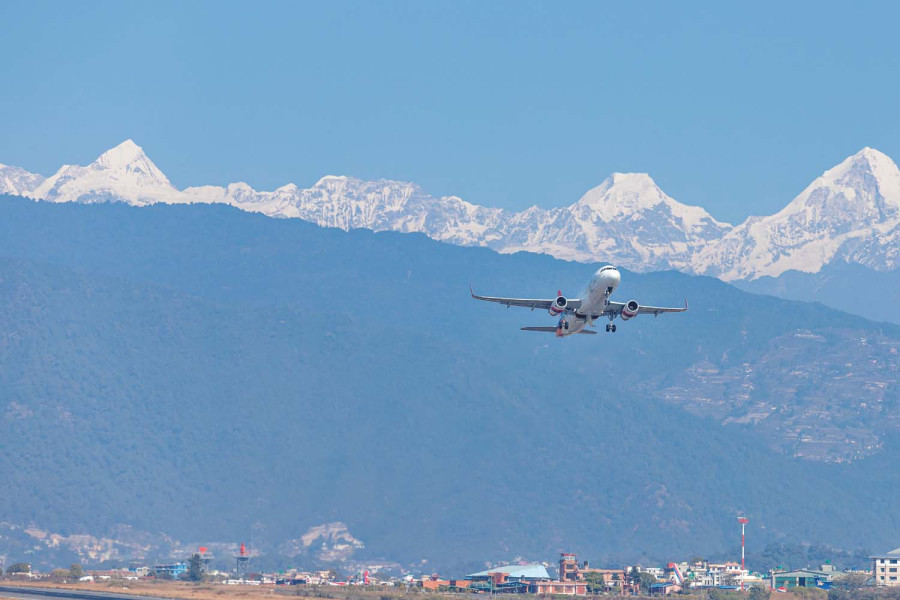Money
Come December, international air travel liability limits are set to rise
As per the convention Nepal adopted in 2018, the death or bodily injury limit will jump to $202,500 from $171,018.
Sangam Prasain
Travellers on international airlines will soon benefit from higher compensation limits. The International Civil Aviation Organization (ICAO) announced that the Montreal Convention liability limits for death, injury, delays, baggage, and cargo issues will increase on December 28, 2024. Nepal implemented the Montreal Convention for the first time on December 15, 2018.
Millions of air passengers worldwide are entitled to compensation for yearly flight delays, cancellations, and overbooking. Because passengers are unaware of their rights and airlines make it so hard to get their money, less than 2 percent receive their flight compensation, according to a study.
Here is what you need to know about the Montreal Convention and your air passenger rights. Claim what you owe.
What is the Montreal Convention 1999 or MC99?
The Montreal Convention is a multilateral treaty adopted by a diplomatic meeting of International Civil Aviation Organisation member states in 1999. Ratified in 1999 and enacted in 2003, the Montreal Convention was a successor to the Warsaw Convention 1929.
Formally known as the Convention for the Unification of Certain Rules for International Carriage by Air, the Montreal Convention 1999 (or MC99) has established a comprehensive and unified framework for the international carriage of passengers, baggage, and cargo by air. It introduced several elements to balance the interests of travellers, cargo shippers, and the aviation industry.
The Convention sets liability limits for airlines, ensuring fair compensation for consumers in cases of injury, death, delay, baggage and cargo issues.
ICAO has informed the 140 State Parties that the limits will increase in line with the Convention’s built-in review mechanism, which adjusts for inflation every five years. This ensures that passenger and cargo compensation remains appropriate over time. This is the fourth review since the treaty came into force in 2003.
"ICAO continues to advocate for the universal ratification of MC99," said Juan Carlos Salazar, the ICAO secretary general, in a statement. "This Convention is fundamental in protecting consumer interests in international air travel. By promoting harmonisation and codification of rules governing international carriage by air, MC99 benefits passengers and cargo shippers while enabling the unified and equitable development of air services."
What are the liability provisions?
The liability limits are indicated in Special Drawing Rights (SDRs), a unit of account defined by the International Monetary Fund. For indicative purposes, 1 SDR has been valued at US$ 1.33318 on October 18, 2024.
What are the revisions?
The limits will be revised as follows:
1. The death or bodily injury limit will increase from 128,821 SDRs to 151,880 SDRs (about US$202,500). It originally was 100,000 SDRs in 2003.
2. The limit for passenger transport delays will rise from 5,346 SDRs to 6,303 SDRs (about US$8,400).
3. The limit for baggage destruction, loss, damage, or delay will increase from 1,288 SDRs to 1,519 SDRs (about US$2,000).
4. The limit for cargo destruction, loss, damage, or delay will rise from 22 SDRs to 26 SDRs per kilogram (about US$35).
ICAO has invited the States Parties to MC99 to make provisions as necessary in accordance with their domestic legal requirements, to give full effect to the revised limits as of December 28, 2024.
What’s the case of Nepal?
The Montreal Convention allows air passengers on international flights to claim compensation for damages caused by travel disruptions and luggage problems.
Since travellers in Nepal are not aware that they can file a compensation claim, many passengers protest at the airport against the delays, cancellations, baggage damages and other issues caused by the airlines' negligence. For example, if the passengers' baggage is damaged, under the rule, passengers can claim up to $2,000 with the particular airline.
However, the Montreal Convention waives the airline’s liability in cases where extraordinary circumstances caused the flight disruption. Such cases include adverse weather, Air Traffic congestion and restrictions, lightning strikes, bird strikes, strikes at the airport, medical emergencies, security threats, and political unrest, etc.
You can also claim when … ?
On November 30 last year, Flight RA229 of the state-owned Nepal Airlines flew two hours before its scheduled departure, leaving 31 passengers stranded at midnight at Kathmandu’s Tribhuvan International Airport.
The reason for the rushed departure was the flight’s VVIP status. Then-prime minister Pushpa Kamal Dahal was on the same flight. The flight was planned for Dahal, who left for Dubai leading the Nepali delegation to the 28th Conference of Parties to the United Nations Framework Convention on Climate Change (COP 28). According to experts, the case is severe negligence by the airline company, and passengers can still file compensation cases as per the Convention.
The MC99 extends a time frame within which a passenger can claim compensation for damages – up to two years following the occurrence of the flight disruption. If the claim pertains to damaged, lost, or delayed luggage, it's imperative to report the issue expeditiously. Claims for damaged baggage should be filed within seven days, while claims for delayed baggage must be initiated within 21 days. If your bags remain unclaimed for more than 21 days and are considered lost, you still can file a claim within two years.
Where to file the claims?
According to Vijay Shrestha, vice-president of administration at Himalaya Airlines, passengers can file a compensation claim by filling out a “property irregularity form” at the airline office or the airline’s ground handling agent in any destination airport.
Luggage will be categorised as lost if the airline cannot trace it for 21 days from filing the property irregularity report. All claims shall be substantiated with an itemised list of contents, description, age, and proof of purchase or ownership of all items.
At Kathmandu airport, passengers can file compensation claims for loss, delay, or damage at the lost and found unit of Nepal Airlines. “The compensation provision used to be printed on tickets, but since airlines issue e-tickets nowadays, passengers can go to the ‘contract of carriage by air’ on the airline's website to know the information regarding the loss, delay, or damage,” said Shrestha.
Is MC99 applicable to domestic airlines?
The MC99 makes only international airlines liable in case of passenger death or injury.
A year after Nepal adopted the MC99, preparations for adopting a similar law started but could not proceed, although the draft had been prepared.
Tourism ministry officials say the process was stalled multiple times as governments changed. Since 2019, there have been six fatal plane and helicopter crashes that killed 130 people, and all the families of the victims have been barred from a justifiable compensation that would be $100,000 as per the proposed provisions.
The air carriers’ liability and insurance draft bill for domestic airlines has been sent to the finance ministries for their comments before being tabled by the Cabinet. After the Cabinet nod, the bill will be tabled in Parliament.
What’s the provision in the proposed domestic law?
As per the planned law, domestic airlines have to pay a minimum compensation of $100,000 for the injury or death of a passenger. Currently, the minimum compensation for passenger death on a domestic flight is $20,000.
According to the proposed law, a compensation claim should be filed with the airline or its agents within 60 days of the incident or accident. The carrier’s liability limitation for cargo lost and damaged shall be $20 per kg if the damage was caused or contributed to by the negligence of the airlines, it says. The cargo damage is limited up to $5,000.
The compensation for the hand baggage, if lost or damaged, shall be $400.
Under the Montreal Convention 1999, effective as of December 28, 2019, a carrier’s liability limitation for cargo lost, damaged or delayed shall be 22 SDRs per kg ($29.21 per kg) in the case of destruction, loss, damage or delay concerning cargo carriage.
Carriers must pay 1,288 SDRs ($1,709.90) for each passenger in case of baggage destruction, loss, damage, or delay.
Likewise, 5,346 SDRs ($7,097.16) should be compensated for each passenger in relation to damage caused by delay in the carriage of persons.




 17.13°C Kathmandu
17.13°C Kathmandu














